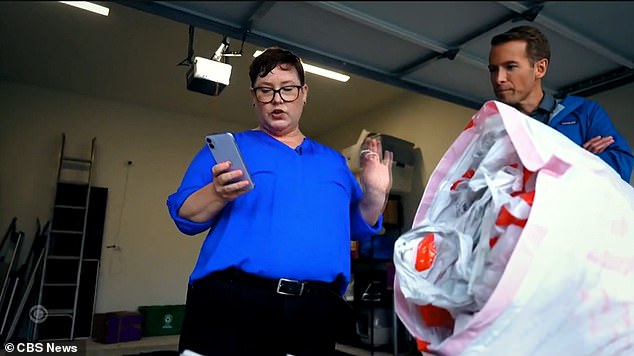A Texas woman curious about where recycled plastics actually end up decided to track her trash using Apple AirTags.
Brandy Deason, an environmentalist, stored 12 devices in her recycling bin and watched as they traveled around Houston.
Although three of them were missing, nine of the trackers ended up 20 miles outside the city at a waste management facility.
Deason became suspicious when Houston launched a new program called WHEN? that accepted certain plastics not normally considered recyclable, such as polystyrene.
City officials admitted that more than 250 tons of plastic have been collected since the end of 2022, but none has been recycled yet.
Brandy Deason, an environmentalist, was skeptical of Houston’s plastic recycling program and decided to investigate where her plastic was going. She placed 12 AirTags in her plastic bags and watched them travel around the city.
Houston implemented the program in December 2022, alongside ExxonMobil, LyondellBasell and Cyclyx International, allowing residents to dispose of all types of plastics in recycling bins.
Deason took advantage of the new initiative and placed the AirTags inside plastic wrappers, shopping bags, shampoo bottles and other plastics that are typically banned from recycling facilities in the United States.
“We want to know what was going on with these things,” Deason said. Climate news from withinAre you really going to recycle?
She watched the AirTags move around using her smartphone and found that more than half landed at Wright Waste Management, which positions itself as the “new frontier in recycling” but critics call the site “a sham.”
Deason partnered with CBS News for his investigation and visited Wright Waste Management, which is listed as a cardboard recycler who applied in 2022 to operate as a plastic recycler for the Houston program.
CBS sent a drone to the site to capture piles of plastic more than 10 feet high.
Mark Wilfalk, Houston’s top solid waste official, said the city is aware of the problem but said they plan to “stack it for now” and “see what happens.”
Cyclyx promised Houston officials it would open a sorting facility to store and treat plastics that can be turned into recyclable pellets, but construction at Wright Waste Management has yet to begin.

Deason placed the AirTags inside a plastic that isn’t typically accepted at most U.S. recycling facilities to see how successful the Houston program would be.
Not only is plastic piling up, but the Wright plant has failed three county fire safety inspections, according to documents obtained by CBS.
Wilfalk would only say that he and his team would follow up on fire safety inspection issues.
Cyclyx vice president Ryan Tebbetts declined to speak to Inside Climate News about the fire inspector’s failed inspections of the Wright site or its regulatory status.
“Wright Waste Management does not represent us and is currently a temporary solution before we can get our facility up and running,” Tebbetts told the outlet.
However, plastics baking in the hot Texas sun pose a significant fire risk, and there are neighborhoods just outside the site.

Nine of the AirTags ended up 20 miles outside the city at a waste management company called Wright Waste Management. Drone footage shows piles of plastic more than 10 feet high littering the site.
“If it were to catch fire,” Deason said, “the emissions that would come out of it could be very poisonous to the people who live here, not to mention that a large, dangerous fire like that could spread into a neighborhood.”
Houston implemented the program in response to low recycling rates across the city, allowing residents to recycle even bubble wrap and bags that are normally prohibited in such efforts.
The process would superheat certain plastics, melting them and turning them into new materials used as fuel and other products.
However, environmentalists have long warned that this option releases highly toxic air pollution, which contributes to global warming and should not be classified as recycling at all.


